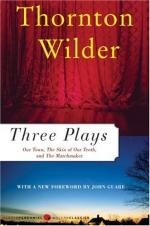|
This section contains 793 words (approx. 2 pages at 400 words per page) |
The Gilded Age
The phrase "Gilded Age" comes from the title of an 1873 book by Mark Twain and Charles Dudley Warner. The book was an exposé of corruption in politics and business after the end of the Civil War in 1865, but the phrase is used today to describe the American situation throughout the last third of the century.
Economically, the era was notable for the rise of industry. The population was in the process of shifting from rural to urban, and the growth of cities provided the workforce to create larger production facilities. Railroads expanded across the country—the transcontinental railroad was completed at Promontory, Utah, in 1869—making it possible to move materials for production and to ship manufactured products nearly anywhere on the continent. From 1870 to 1900, the use of bituminous coal, which powered industry, rose tenfold, and the use of rolled iron and steel increased to twelve times what it had been. The country's gross national product multiplied six times over in those years. Out of this situation arose the businessmen who made giant fortunes from this economic growth, usually by controlling an entire industry, as John D. Rockefeller controlled the oil industry, Andrew Carnegie controlled steel, and J.P. Morgan controlled banking. At the same time that a few individuals were amassing incredible fortunes, there was terrible poverty and illness among the common laborers who worked in the factories.
Although The Matchmaker takes place among shops and not factories, the economic situation of the times can still be seen in the disparity between the characters' finances. Horace Vandergelder, a store owner, comes off as a miserly tyrant who carries stacks of twenty dollar bills in his wallet, while his clerks, who are forced to work from six in the morning to nine at night six days a week, have to scrounge for train money. And while class differences will always be present, this play portrays the restaurant as being a particularly unsafe place for those of the lower classes. By contemporary standards, Vandergelder is a heartless, petty tyrant, and the Harmonia Gardens Restaurant is too snobby, but the 1880s were a time of extreme wealth and poverty.
Nostalgia
The time when The Matchmaker was produced was a particularly trying time in American history. After the tumultuous decades of the 1930s, which saw the worst economic depression in the nation's history, and the 1940s, which were defined by the second world war, the 1950s were peaceful and prosperous. Still, even as external conflict was lacking, there were social forces that served as continuous reminders of life in the modern world.
One defining characteristic was the awareness of the potential for nuclear destruction. World War II ended after the United States dropped the first nuclear bomb ever used on August 5, 1945, killing almost 130,000 people with one blast. The second bomb was dropped on Nagasaki on August 9, 1945. In the 1950s, people were aware of the devastation of the bombs and uncertain of the ability of politicians to refrain from using them. People at that time practiced disaster drills to prepare for nuclear attacks. Homeowners built bomb shelters and stocked them with food, preparing for the time, that could come any day, when civilization would be wiped away in an instant.
The other defining element of the 1950s was the Cold War. During World War II, the Soviet Union and America were allies in the fight against German aggression. After the war, though, their different political ideologies led them to be fierce competitors. The Soviet Union pursued a policy of spreading communism around the globe, leading to an American foreign policy based on containing communism. There were hearings, led by Senator Joseph McCarthy of Wisconsin, aimed at identifying communists who had infiltrated the U.S. government and the entertainment industry in order to spread communist ideas. (McCarthy was later censured by the Senate, and his name has come to be associated with systematized fear mongering.) The United States became involved in wars in South Korea and Vietnam with the goal of stopping the growth of communism in those places.
In a time of constant worry about sudden annihilation, of suspicion that treacherous spies were trying to overthrow the government from within and to control American minds, The Matchmaker offered reassuring, light entertainment. It was set in a time in the nation's history when there were no great disturbances, no war or imminent danger. Racial issues are not approached in the play, and genders are equal, with a female-owned shop in New York balancing a male-owned shop in Yonkers. Unlike comedies with contemporary settings, the historical setting of The Matchmaker allowed audiences to forget the problems of the day and to bask in the warm feeling of nostalgia for a simpler time.
|
This section contains 793 words (approx. 2 pages at 400 words per page) |




